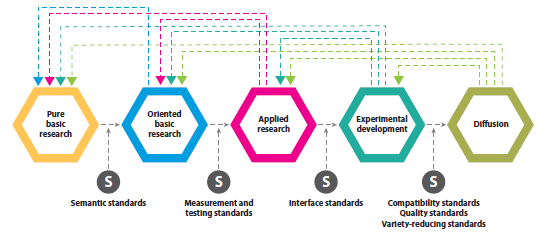The content of this document has been derived form the ETSI publication ‘Understanding ICT Standardization: principles and practice’ by Dr. habil. Nizar Abdelkafi, Prof. Raffaele Bolla, Cees J.M. Lanting, Dr. Alejandro Rodriguez-Ascaso, Marina Thuns, Dr. Michelle Wetterwald
Standardization and standards can be very helpful during the research process. The results of the research process can be used by the standardization process to set new standards. The other way around is also possible, because standards can provide input for the research process. Hence, there is a recursive flow of knowledge from standardization to research. The research and innovation process consists of five different phases: pure fundamental research, focused fundamental research, applied research, experimental development and knowledge diffusion. These stages are supported by different types of standards.
- Terminology standards facilitate efficient communication and are required in both fundamental research and the transfer of knowledge to targeted fundamental research.
- Measurement and testing standards can be used to check whether specific requirements such as performance criteria have been met, while ensuring comparability of results.
- Interface standards enable component interoperability.
- Compatibility, quality and variety reducing standards support diffusion.

Click here to read for a further explanation
For more information about research, research projects and standardization see also standardsplusinnovation
